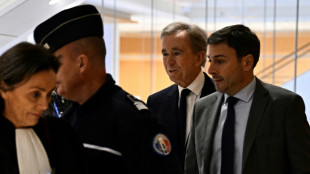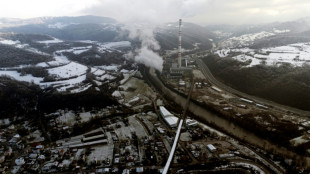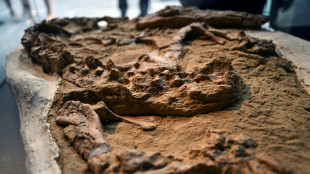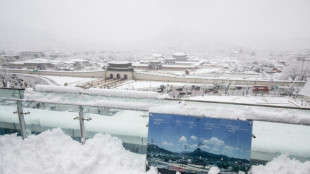
-
 K-pop band NewJeans leaves label over 'mistreatment'
K-pop band NewJeans leaves label over 'mistreatment'
-
Sri Lanka crash to record low Test total of 42 in South Africa

-
 Putin says barrage 'response' to West-supplied missiles
Putin says barrage 'response' to West-supplied missiles
-
Lebanon MPs seek end to leadership vacuum with January presidency vote

-
 Eurozone stocks lift as French political stand-off eases
Eurozone stocks lift as French political stand-off eases
-
French farmers wall off public buildings in protest over regulations

-
 France says ready for budget concessions to avert 'storm'
France says ready for budget concessions to avert 'storm'
-
Lampard appointed Coventry manager

-
 French luxury mogul Arnault defiant at ex-spy chief trial
French luxury mogul Arnault defiant at ex-spy chief trial
-
South Africa bowled out for 191 against Sri Lanka

-
 'Europe's best' Liverpool aim to pile pain on Man City
'Europe's best' Liverpool aim to pile pain on Man City
-
Hezbollah under pressure after war with Israel

-
 OPEC+ postpones meeting on oil output to December 5
OPEC+ postpones meeting on oil output to December 5
-
Zelensky slams Russia's 'despicable' use of cluster munitions in energy strikes

-
 One dead, thousands displaced as floods hit southern Thailand
One dead, thousands displaced as floods hit southern Thailand
-
Lebanon army deploys under Israel-Hezbollah ceasefire

-
 Imran Khan's wife Bushra Bibi emerges as Pakistan protest figure
Imran Khan's wife Bushra Bibi emerges as Pakistan protest figure
-
COP16 biodiversity talks to restart in February: UN

-
 Iran to hold nuclear talks with three European powers
Iran to hold nuclear talks with three European powers
-
French govt ready for budget concessions to avoid financial 'storm'

-
 Hong Kong airport third runway takes off
Hong Kong airport third runway takes off
-
In Bosnia, the path to renewables runs through its coal mines

-
 China probes top military official for corruption
China probes top military official for corruption
-
Syria war monitor says more than 130 dead in army-jihadist clashes

-
 China says top military official Miao Hua under investigation
China says top military official Miao Hua under investigation
-
Taiwan president's plan to stop over in Hawaii, Guam angers Beijing

-
 Russian attacks leave one million Ukrainians without power
Russian attacks leave one million Ukrainians without power
-
Markets mixed after subdued pre-holiday shift on Wall St

-
 What would an ICC arrest warrant for Myanmar's junta chief mean?
What would an ICC arrest warrant for Myanmar's junta chief mean?
-
China says top military official Miao Hua suspended, under investigation

-
 Taiwan's Lai to stop over in Hawaii, Guam during Pacific trip
Taiwan's Lai to stop over in Hawaii, Guam during Pacific trip
-
Namibia extends voting after logistical issues

-
 LIV Golf's Herbert in charge at Australian Open, Smith two back
LIV Golf's Herbert in charge at Australian Open, Smith two back
-
Despair in Sweden as gangs recruit kids as contract killers

-
 Russia launches massive aerial attack on Ukraine's energy sector
Russia launches massive aerial attack on Ukraine's energy sector
-
Peru scientists unveil crocodile fossil up to 12 million years old

-
 At plastic treaty talks, no united front for industry
At plastic treaty talks, no united front for industry
-
Williamson falls for 93 as England fight back in first Test

-
 South Korea officials say three dead in heavy snowfall
South Korea officials say three dead in heavy snowfall
-
High-flying Fiorentina face test of Scudetto credentials with Inter visit

-
 Verstappen switches focus to re-boot defence of F1 teams' title
Verstappen switches focus to re-boot defence of F1 teams' title
-
UK filmmaker Richard Curtis makes first foray into animation

-
 Countrywide air alert in Ukraine due to missile threat
Countrywide air alert in Ukraine due to missile threat
-
China's military corruption crackdown explained

-
 Primark boss defends practices as budget fashion brand eyes expansion
Primark boss defends practices as budget fashion brand eyes expansion
-
Williamson eyes ton as New Zealand take control against England

-
 Norway faces WWF in court over deep sea mining
Norway faces WWF in court over deep sea mining
-
Trump, Sheinbaum discuss migration in Mexico amid tariff threat

-
 Asian markets mixed after subdued pre-holiday shift on Wall St
Asian markets mixed after subdued pre-holiday shift on Wall St
-
Orban's soft power shines as Hungary hosts Israeli match


Ecuador terrorized by Mexican-led drug trafficking explosion
Once a relatively peaceful neighbor of major cocaine producers Colombia and Peru, Ecuador has become a battleground for criminal gangs looking to control the drug trafficking trade, analysts and authorities say.
The violence is grim and takes multiple forms: car bombs, prison massacres and bodies hanging from bridges have become commonplace. Decapitated heads are found in the streets.
The South American country of 18 million -- which for years was merely a transit point in the narcotics trade -- has become a "sanctuary for organized crime," former military intelligence chief Mario Pazmino told AFP.
"The explosions and assassinations that we see are messages of terror to tell us that they, not the police, control a strategic area," he added.
In 2020, Ecuador ranked third behind Colombia and the United States in terms of the amount of cocaine seized, accounting for 6.5 percent of the global total, according to the UN Office against Drugs and Crime.
Hundreds of tons of cocaine leave its ports every year to be distributed around the world, although most of it heads to the United States and Belgium.
In a 2019 report, Ecuadoran intelligence said there were at least 26 criminal gangs fighting for control of the lucrative market, but officials now say that number could have risen. Many of those criminal groups work with Mexican cartels.
And as drug trafficking activity intensifies, so too does criminality.
Ecuador's murder rate in 2021 was 14 per 100,000 inhabitants, almost double that of the previous year, according to the interior ministry.
- Criminals 'deviated to drug trafficking' -
To understand how drug trafficking mutated in Ecuador, one must look back to the start of the 2000s.
"In those years, Ecuador began a tough campaign to eradicate coca plantations," explained Pazmino.
Coca leaf is the main ingredient used to make cocaine.
But just like in other countries, the initiative failed -- whenever authorities would destroy crops, growers would simply move to a new area and start again.
A decade later, Ecuador even registered a record area of coca plantations.
The failed anti-drugs policy encouraged Mexican cartels such as the Sinaloa, Gulf Clan and Los Zetas to move into Ecuador, just as they had already done in Colombia.
Ecuador's dollarized economy facilitated the cocaine trade, allowing for easy money laundering of profits, while weak institutions and criminal groups ready to cooperate created a perfect opportunity to cash in for those involved.
At the origin of the Mexican infiltration was Jorge Luis Zambrano, known as 'Rasquina' and the leader of the Los Choneros gang, according to former prisons director Alexandra Zumarraga.
In 2010, Zambrano offered protection to the Sinaloa cartel, which burst into the strategically located coastal province of Manabi.
There were also "members of the Latin Kings and Netas gangs ... who turned to drug trafficking," said a human rights activist who works with youth groups and requested anonymity due to death threats.
For Martha Macias, the former director of Guayaquil's biggest penitentiary, "the drug traffickers of today are the grandchildren of the Latin Kings and Netas who operated in Quito and Guayaquil, and focused on robberies and contract killings."
The prison formerly run by Macias is where the majority of prison massacres since February 2021 have taken place, leaving almost 400 inmates dead.
Rival drug cartels often operate from within the prison walls, meaning their turf wars can unfold on the inside.
- 'They saw an opportunity' -
Until his murder in 2020, Zambrano was the overall leader of Ecuador's criminal gangs, which according to authorities counted up to 25,000 members -- in a country that has just 50,000 police.
His slaying sparked a leadership battle both inside and outside the prisons.
With the proliferation of organized crime, some local gangs, such as the Lobos and Los Tiguerones, morphed into micro-cartels.
"They saw an opportunity, buying drugs and processing them in the country, to then export them," said Pazmino.
Both gangs work with Mexico's Jalisco New Generation cartel, and have been responsible for deadly prison riots.
Since the start of 2021, some 300 tons of drugs have been confiscated in Ecuador, Interior Minister Patricio Carrillo said.
But authorities are struggling to keep up with the cartels' expanding business.
Less than 30 percent of the drugs passing through Ecuador's ports and airports are seized, despite a record 210 tons being impounded last year.
"Around 700 tons of cocaine a year comes into Ecuador from neighboring countries" Colombia and Peru, said Pazmino.
A.Gasser--BTB

